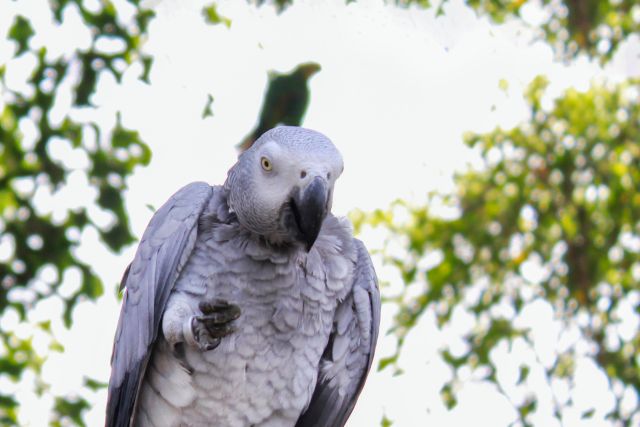African Grey parrots have the reputation of being birds prone to biting. This isn’t really a fair reputation. The majority of biting issues are related to not being properly socialized. In short, the African grey bites, because they’re afraid or disapproving of something, and biting is the only way for them to tell you. So you see, calling them biting birds or mean birds isn’t fair if they’re biting because they’re afraid. How else are they supposed to protect themselves? Especially since most bird owners clip the wings of their pets almost immediately as most petshops, breeders and vets highly recommend this for the bird’s safety not to fly and hurt themselves.

We highly disagree with this and believe a bird cannot be ultimately healthy if it cannot exercise properly by flight. A bird’s respiratory system doesn’t even work properly unless in flight! Their entire being is built around being able to fly, so why bring them into our homes to enjoy only to take that away? It is the one thing that makes them unique from so many other mammals. Flight can be something both your bird and you can enjoy if you do the proper flight training.
However when it comes to everyday skills, in order to properly socialize your African Grey, plan on having an abundance of patience, lots of love and understanding, and the desire to build a strong bond of love and trust with your Grey. And maybe some treats on hand, too!
Why lots of patience? Well imagine someone is trying to get you to not be afraid of them and they’re 20 times your size and they speak a language you don’t completely understand and they’re picking you up and touching you and asking you to do things you don’t understand or don’t want to do. Are you going to immediately go “oh, okay I’m going to trust this person” or is it going to take some time for you to learn to trust them? Training bridges the gap between speaking different languages, that’s why it is so important to implement parrots.
Other reasons an African Grey may develop a biting habit are because they’re bored and sexually frustrated – this happens during sexual maturity and is stressed by their environment.
Your first step to stopping the biting behavior is to first make sure your bird is receiving optimal care. This means they’re getting plenty of good sleep (12 hours per night), have a quality pellet-based diet (preferably organic) with an abundance of fresh fruits and vegetables, and are getting lots of out-of-the-cage time with you. For more information on the diet see more about the African Grey parrot’s diet.
The second step is to spend time with your African Grey every day training them. Not only will this training eliminate current biting habits, but it will also go a long way toward preventing any future behavior issues. You will be shocked at how little it takes to train and how fast these parrots catch onto it! I’ve taught tricks in under 2 minutes once a bird understood the premise of training. When you are able to speak the same language, everything else falls into place. Your training sessions should literally not exceed over 5 minutes and should be more so around a minute and a half to two minutes! Always leave your bird wanting more (as well as yourself) to keep it fun and interesting.
It is important to note that if your African grey already has a biting habit, immediately evaluate how you react to this behavior. Quite possibly your reactions are reinforcing the behavior. Aggressive reactions like yelling or hitting will breed more aggression. Remember parrots think, “fight or flight” and when you take their ability to fly away from a situation that makes them uncomfortable you’re just asking for a fight.
Dramatic reactions like giving your bird a time out or screaming and jerking your hand away may give them the attention they’re seeking or simply be the creation of bad habits which will encourage them to repeat the behavior. The best reaction from you is no reaction at all. Successful training begins with reinforcing the positive behaviors and doing your darndest to ignore the negative behaviors.
